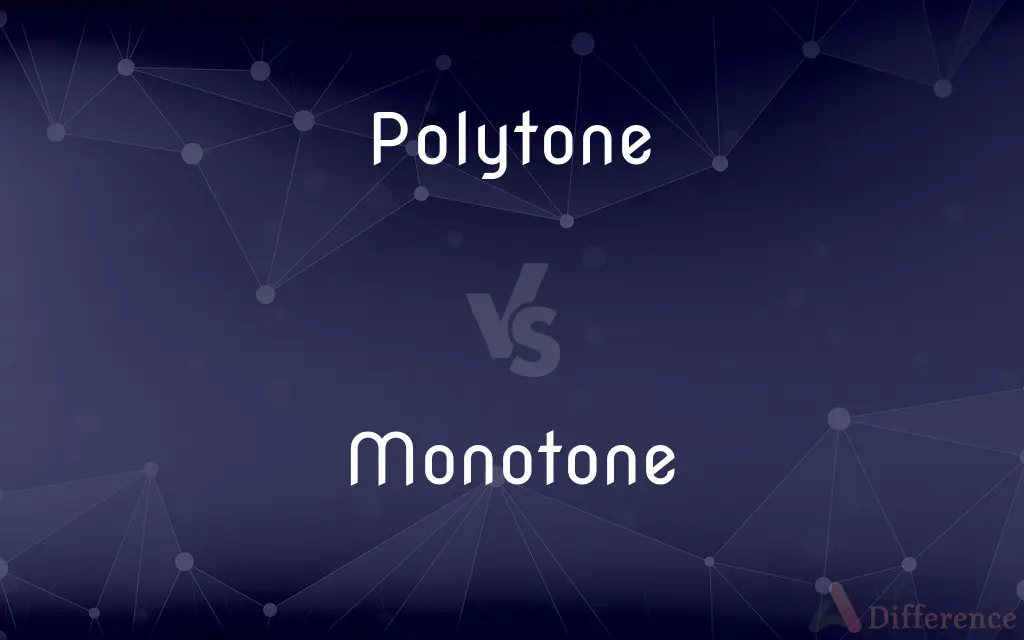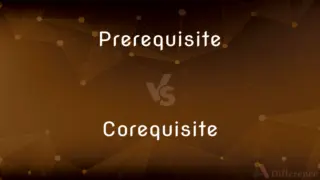Polytone vs. Monotone — What's the Difference?
By Tayyaba Rehman & Maham Liaqat — Updated on March 26, 2024
Polytone involves variations in pitch, contributing to dynamic and expressive speech or music, whereas monotone implies a uniform pitch, often resulting in a flat or dull expression.

Difference Between Polytone and Monotone
Table of Contents
ADVERTISEMENT
Key Differences
Polytone, in linguistics and music, refers to the use of multiple pitches or tones in speech or musical composition, creating a rich and dynamic auditory experience. This variation in pitch can convey emotions, emphasize points, and enhance musicality. In contrast, monotone describes speech or music that maintains a single, unvarying pitch throughout, which can lead to perceptions of dullness or lack of engagement.
The presence of polytone in spoken languages, such as in tonal languages where pitch can alter meaning, showcases its importance in communication and cultural expression. Monotone speech, on the other hand, might be deliberately used for specific effects, such as conveying disinterest or creating a minimalist musical piece, but generally lacks the expressiveness found in polytonic delivery.
Polytonic expression is often associated with emotional depth and engagement, as varying pitch naturally mimics the modulations found in excited or emotionally charged speech. Conversely, a monotone voice can sometimes hinder the listener's ability to connect with the speaker or musician, as it may seem less natural or engaging.
In musical composition, polytone can refer to the use of complex harmonies and varied melodies, enriching the listening experience with depth and texture. Meanwhile, music that employs a monotone approach might focus on rhythm and lyrics, relying on elements other than pitch variation to hold the listener's attention.
The distinction between polytone and monotone extends into their perceived psychological impact. Polytone can stimulate and hold attention, making it a preferred mode in teaching, storytelling, and advertising. Monotone, while less engaging, can be effective in contexts requiring neutrality or minimal distraction.
ADVERTISEMENT
Comparison Chart
Pitch Variation
Multiple pitches, varying tones
Single, uniform pitch
Emotional Expression
Facilitates emotional depth and engagement
Often perceived as lacking emotion or interest
Use in Language
Present in tonal languages, adding meaning and expressiveness
Rare in natural speech, can indicate boredom or disinterest
Musical Composition
Enriches music with complex harmonies and textures
Focuses on rhythm, minimalism, or specific artistic choices
Psychological Impact
Engages and stimulates listeners, enhancing communication
Can seem flat but useful for neutrality or focus
Compare with Definitions
Polytone
Varied pitch to mimic natural speech patterns.
Effective public speakers use polytone to maintain audience interest.
Monotone
Rare in natural speech, indicating a deliberate choice.
The actor's monotone voice lent a unique character to the role.
Polytone
Enhances emotional expression and engagement in music.
The symphony's polytone richness thrilled the audience.
Monotone
Uniform pitch throughout speech or music.
His monotone speech made it hard to stay focused.
Polytone
Adds depth and texture to musical compositions.
The composer's use of polytone created a complex, engaging piece.
Monotone
Useful in settings requiring neutrality.
The documentary narrator's monotone was chosen to avoid influencing viewer emotions.
Polytone
Characteristic of tonal languages, where meaning changes with pitch.
In Mandarin, polytone is essential for accurate communication.
Monotone
Often used for minimalist musical pieces.
The piece's monotone quality highlighted its rhythmic patterns.
Polytone
Use of multiple pitches in speech or music for dynamic expression.
His polytone delivery made the lecture captivating.
Monotone
Can imply boredom or disinterest when used in speech.
Her monotone reply suggested she wasn't excited about the news.
Polytone
A polyphonic ringtone
Monotone
A single tone repeated with different words or time values, especially in a rendering of a liturgical text.
Monotone
A succession of sounds or words uttered in a single tone of voice.
Monotone
A chant in a single tone.
Monotone
Sameness or dull repetition in sound, style, manner, or color.
Monotone
Characterized by or uttered in a monotone
A monotone recitation of names.
Monotone
Of or having a single color
A cat with a monotone coat.
Monotone
Also mon·o·ton·ic (mŏn′ə-tŏnĭk) Mathematics Designating sequences, the successive members of which either consistently increase or decrease but do not oscillate in relative value. Each member of a monotone increasing sequence is greater than or equal to the preceding member; each member of a monotone decreasing sequence is less than or equal to the preceding member.
Monotone
(of speech or a sound) Having a single unvaried pitch.
Monotone
(mathematics) Being, or having the salient properties of, a monotone function.
The function is monotone on , while is not.
Monotone
A single unvaried tone of speech or a sound.
When Tima felt like her parents were treating her like a servant, she would speak in monotone and act as though she were a robot.
Monotone
A piece of writing in one strain throughout.
Monotone
(ambitransitive) To speak in a monotone.
Monotone
A single unvaried tone or sound.
Monotone
The utterance of successive syllables, words, or sentences, on one unvaried key or line of pitch.
Monotone
An unchanging intonation
Monotone
A single tone repeated with different words or different rhythms (especially in rendering liturgical texts)
Monotone
Of a sequence or function; consistently increasing and never decreasing or consistently decreasing and never increasing in value
Monotone
Sounded or spoken in a tone unvarying in pitch;
The owl's faint monotonous hooting
Common Curiosities
What is the main difference between polytone and monotone?
Polytone involves varying pitches for dynamic expression, while monotone maintains a single pitch, often perceived as less engaging.
Why is polytone important in tonal languages?
In tonal languages, polytone is crucial as pitch variations change the meanings of words, making it essential for accurate communication.
How does polytone enhance a musical composition?
Polytone adds depth, texture, and emotional complexity to music, making compositions more engaging and expressive.
Is it possible for someone to speak naturally in a monotone?
While rare, some individuals may naturally speak in a monotone due to various factors, though it's often perceived as lacking in emotion.
Can monotone speech ever be effective?
Yes, monotone can be effective in contexts requiring neutrality or minimal emotional influence, such as certain types of narration.
Are there any benefits to using a monotone voice?
Using a monotone voice can benefit situations where distraction needs to be minimized or when conveying information without emotional bias.
How do speakers use polytone to keep an audience engaged?
Speakers use polytone by varying their pitch to mimic natural, excited speech, thereby maintaining interest and engagement.
Does polytone affect the listener's emotional response?
Yes, polytone can significantly influence emotional engagement and response by mirroring natural speech patterns and adding expressive depth.
How can monotone be used artistically in music?
Monotone can be used to focus attention on rhythm, lyrics, or to create a specific minimalist aesthetic.
Can the use of monotone be a stylistic choice?
Yes, artists and speakers may choose a monotone delivery for stylistic reasons, to achieve a specific effect or convey a particular mood.
Why might someone deliberately speak in monotone?
Someone might deliberately speak in monotone to convey disinterest, maintain neutrality, or as part of a character portrayal.
Is polytone more common in speech or music?
Polytone is common in both speech and music, enhancing expressiveness and emotional depth in communication and artistic expression.
What role does polytone play in storytelling?
Polytone plays a crucial role in storytelling by adding emotional nuance and helping to differentiate characters or emphasize moments.
How do cultural perceptions of polytone and monotone differ?
Cultural perceptions vary, with polytone generally seen as expressive and engaging, while monotone can be viewed as dull or disinterested, though both have their place in communication and art.
Can monotone music be emotionally engaging?
While less common, monotone music can engage listeners emotionally through other elements like lyrical content or rhythmic complexity.
Share Your Discovery

Previous Comparison
Prerequisite vs. Corequisite
Next Comparison
Howitzer vs. MortarAuthor Spotlight
Written by
Tayyaba RehmanTayyaba Rehman is a distinguished writer, currently serving as a primary contributor to askdifference.com. As a researcher in semantics and etymology, Tayyaba's passion for the complexity of languages and their distinctions has found a perfect home on the platform. Tayyaba delves into the intricacies of language, distinguishing between commonly confused words and phrases, thereby providing clarity for readers worldwide.
Co-written by
Maham Liaqat















































